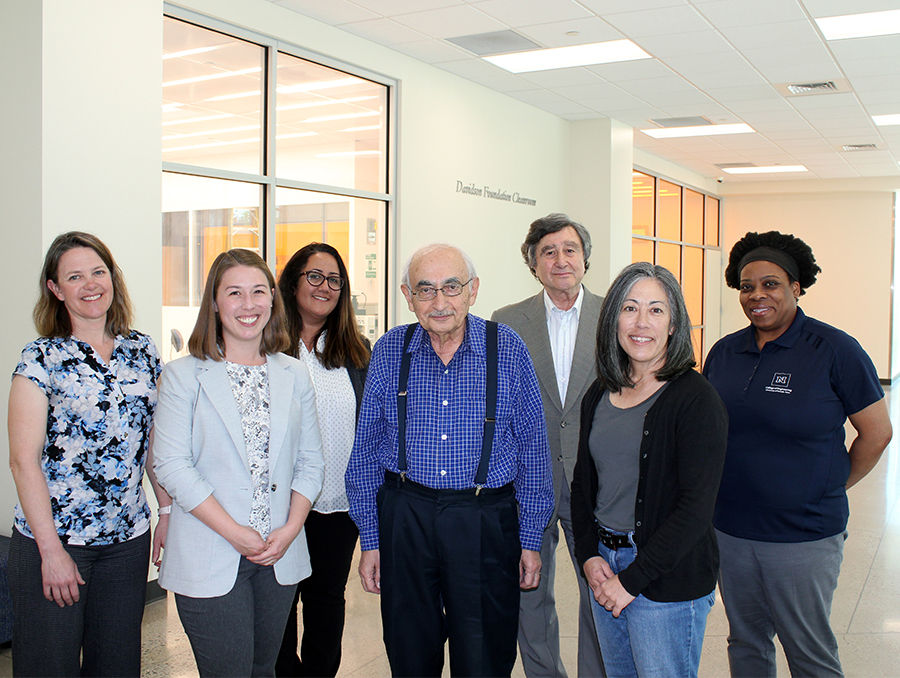The University of Nevada, Reno will build the cyber foundation and provide scientific and technical expertise in a multi-institution, $23 million collaborative research project to study the links between and to develop the infrastructure for solar energy, environment and water in Nevada as well as apply that to economic development, workforce development and education.
The University will have major contributions in terms of creating advanced cyber-infrastructure capabilities for data communication, processing and management. This cyber-infrastructure will serve the needs at the nexus of the research initiative: the confluence of renewable energy, water, and the environment; and advancing related human infrastructure and workforce development.
This project represents a major research and development endeavor in Nevada to address the national priority of creating renewable energy resources. The abundant solar flux in Nevada makes it one of the best possible sources for solar energy generation in the world. If properly explored and used, this source of renewable energy has the potential to diversify the economy of the state. However, any substantial harvesting of solar energy in Nevada could negatively affect the state's scarce water resources and sensitive desert environment.
Understanding the linkages (or nexus) among solar energy development, limited water resources, and fragile environments in Nevada is the focus of the work. It will establish a statewide center of research excellence on solar energy conversion to electricity with the goal of minimizing the conversion's negative impacts on water usage and the environment.
The five-year, Nevada System of Higher Education collaboration, The Solar Energy-Water-Environment Nexus in Nevada, is funded by a $20 million grant from the National Science Foundation, and NSHE will provide $3 million. From the National Science Foundation funding, the University of Nevada, Reno is receiving $6.8 million, the University of Nevada, Las Vegas is receiving $7.4 million and the Desert Research Institute is receiving $3.7 million.
Three main components, the solar energy-water-environment nexus, cyber infrastructure and human infrastructure/workforce development, are encompassed in the project. Sergiu Dascalu of the College of Engineering will lead the cyber-infrastructure component. Jacque Ewing-Taylor from the College of Education will lead the human infrastructure/workforce development component. The solar energy-water-environment nexus component is led by Robert Boehm and Jacimaria Batista of UNLV, Markus Berli of DRI and Dale Devitt of UNLV. The project director is Gayle Dana of the Nevada National Science Foundation Experimental Program to Stimulate Competitive Research Office and DRI.
As many as 150 people will be employed by the project. Of the 41 faculty participants in the project, 15 are University of Nevada, Reno faculty. In the cyber-infrastructure group are Dascalu, Fred Harris, Yaakov Varol, Sushil Louis and Mehmet Gunes from the computer science engineering department and Graham Kent and Ken Smith from the Nevada Seismological Laboratory in the College of Science.
In the Solar Energy-Water-Environment nexus group are Mehdi Etezadi-Amoli and Sami Fadali in the electrical and biomedical engineering department, Amy Childress in the civil engineering department, Chanwoo Park in the mechanical engineering department and Tom Harris in the University of Nevada, Reno Center for Economic Development.
In the workforce development group, in addition to Jacque Ewing-Taylor, are Mike Collopy, director of the Academy for the Environment, and Nancy Latourette in the Computer Science and Engineering Department. This team will develop new approaches to Science, Technology, Engineering and Math education, engage stakeholders, and help build project-related workforce for a diversified Nevada economy.
A new facility, the Nevada Environment, Water, and Solar Testing and Research Facility or NEW-STAR, will be created. It will involve interdisciplinary collaboration among faculty and staff with a broad range of relevant backgrounds. It will also support new positions to bridge existing gaps in research capabilities and attract new talented graduate students in the project's areas of research.
"The successful collaboration that began with the first EPSCoR grant is sure to continue as we build on our capabilities in cyber-infrastructure and computational research," said Kevin Carman, executive vice president and provost at the University of Nevada, Reno. "With 15 faculty from four of our colleges involved in all aspects of the project, we're proud to be providing major contributions in research and scientific and technical expertise, including workforce development that will benefit all Nevadans."











